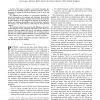Free Online Productivity Tools
i2Speak
i2Symbol
i2OCR
iTex2Img
iWeb2Print
iWeb2Shot
i2Type
iPdf2Split
iPdf2Merge
i2Bopomofo
i2Arabic
i2Style
i2Image
i2PDF
iLatex2Rtf
Sci2ools
TASLP
2016
2016
Bayesian Analysis of Phoneme Confusion Matrices
Abstract—This paper presents a parametric Bayesian approach to the statistical analysis of phoneme confusion matrices measured for groups of individual listeners in one or more test conditions. Two different bias problems in conventional estimation of mutual information are analyzed and explained theoretically. Evaluations with synthetic datasets indicate that the proposed Bayesian method can give satisfactory estimates of mutual information and response probabilities, even for phoneme confusion tests using a very small number of test items for each phoneme category. The proposed method can reveal overall differences in performance between two test conditions with better power than conventional Wilcoxon significance tests or conventional confidence intervals. The method can also identify sets of confusion-matrix cells that are credibly different between two test conditions, with better power than a similar approximate frequentist method.
| Added | 10 Apr 2016 |
| Updated | 10 Apr 2016 |
| Type | Journal |
| Year | 2016 |
| Where | TASLP |
| Authors | Leijon Leijon, Gustav Eje Henter, Martin Dahlquist |
Comments (0)

